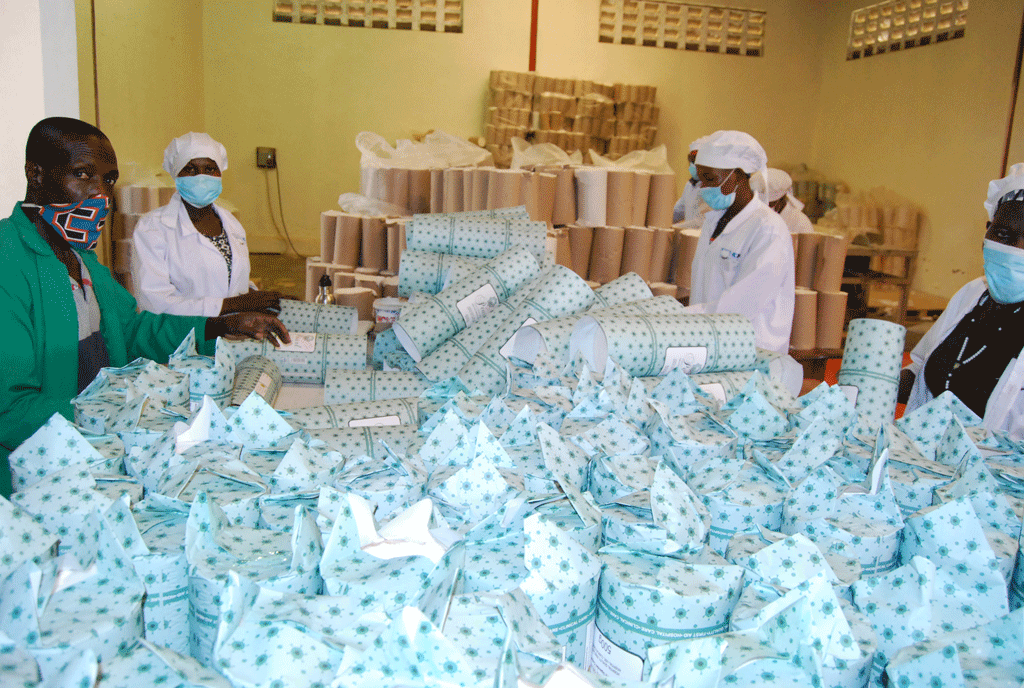Prime
How Luuka company is adding value to cotton

Workers pack batches of cotton wool at Mutuma Commercial Agencies in Luuka District on May 12, 2023. PHOTO/PHILIP WAFULA
What you need to know:
- The factory, commissioned by President Museveni in 2014, manufactures absorbent cotton wool, edible cooking oil, and cotton cake for animal feeds, among others.
During the International Labour Day celebrations in Namutumba District on May 1, President Museveni hailed a “boy” who was adding value to cotton in Luuka District.
“We had a boy in Luuka (District), the one who was adding value to cotton to make cotton for the hospitals which they were buying from outside. I don’t know what is happening to that boy of Luuka now,” Mr Museveni wondered.
The President was referring to Mr Evans Musiime Mugisha, 41, whose family is the majority shareholder (53 percent) of Mutuma Commercial Agencies in Luuka District. The government, through Uganda Development Cooperation (UDC), has 36 percent shareholding while 11 percent remains unallocated.

Evans Musiime Mugisha (L), a shareholder of Mutuma Commercial Agencies in Luuka District, and Philip Ndungutse, the Production Manager, stand next to a gin at the factory on May 12, 2023. PHOTO/PHILIP WAFULA
When Mr Museveni commissioned the company on June 22, 2014, he was taken around by Mr Musiime, who was 33 years old at the time, his brother Mr Edwin Mwesigye, and mother Ms Margaret Tumuhairwe. Mr Musiime told Monitor that he missed Mr Museveni’s Labour Day speech, but later received “several phone calls” informing him of what the President had said about the business.
“When the President visited the factory in 2014, he asked us where the company was and the challenges we were facing; basically, he was quite surprised because he didn’t envision this project being in such a rural setting,” he said in an interview at the weekend.
According to Mr Musiime, the factory is strategically located in a rural area because they want to be close to raw materials - cotton. The business started in 1999, but the factory was in 2005 bought from the defunct Busoga Growers.
“When the President came, the biggest challenge was the working capital requirement; we had the machinery, we were producing stock and needed to invest in more money to be able to supply the demand at the time,” he said.
“So that is how our engagement with the President came in, and it was upon his recommendation that UDC came on board around 2020,” he added.
Mr Musiime said their interest is in value addition because it has more benefits. “There are other products that we focus on and are looking at introducing, and all of them are cotton-related. Once that is done, the factory will run at 100 percent,” he added.
“In terms of marketing, we are now at least stable; previously, there were challenges, but now under the Buy Uganda, Build Uganda (Bubu) scheme, we have been signed on, all consumables from down here are all being consumed, which is a big plus for us,” he explained.
According to Mr Musiime, the company currently has a “whole package”, including an oil mill, ginnery, and cotton-processing plant ginnery as their core business.
The company, he says, manufactures pearl fine absorbent cotton wool, edible cooking oil, cotton cake for animal feeds, cotton husks for mushroom growing and soap stock, a raw material for making soap, while the lint is for export.
With the right investment, Mr Musiime says the company has plans to increase the capacity of the current investment in order to support import substitution with good quality locally made products and export promotion by the increased output.
Mr James Peter Ikom, the company’s general manager, says they have averaged about 236 workers since 2020, but the number projects to reach 320 by next year.
“In 2020, the company purchased 750 tonnes of cotton, which increased to 830 tons in 2021 and to about 950 tonnes currently; however, the figure expects to grow to 2,000 tonnes by next year,” Mr Ikom said.

President Museveni (with hat) on a tour of the cotton factory owned by Mutuma Commercial Agencies in Luuka District on June 22, 2014. PHOTO/PPU
Monitor has learnt that last month, the company was contracted by NMS to make supplies for surgical cotton wool for a period of three years.
Other cotton ginneries in Busoga Sub-county, including Balawoli in Kamuli District, are only into ginnery, meaning they buy seeds, export all the lint, sell the seeds, close the ginnery, and wait for the next season.
While Mutuma Commercial Agencies buys cotton from Luuka, Mr Musiime says it is not as much as that bought from Kaliro, Kamuli, and Buyende districts.
Mr Aggrey Musena, the Luuka District production officer, however, said some of the cotton is grown in the area and by some farmers in isolated areas.
“Luuka is now predominantly a sugarcane-growing area, and it is because of that competitiveness of the two crops (cotton and sugarcane) which is causing all that, but the good thing is that the factory works.
“They even buy cotton from as far as Lira, so they are in business,” Mr Musena said, adding that Luuka has about 1,500 cotton farmers.





